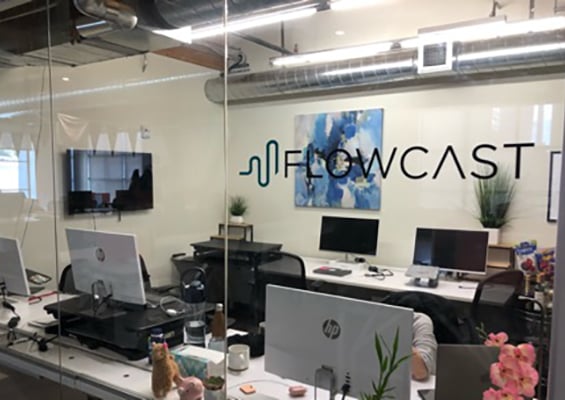Ken So is the founder and CEO of Flowcast (Tillful), an SF-based fintech startup that provides an AI-based credit solution to help small businesses build and access their credit. He’s also a Berkeley Haas alum and graduated from the evening & weekend MBA program in 2009. He shares five key lessons in building a startup based on his own experience.
If you’re interested in writing a guest post for the Berkeley MBA blog, please reach out to brittany.voris@berkeley.edu.
Five key lessons in building a startup
If there’s any good time to found a startup, I would say this is it.
We know that the COVID-19 pandemic is the worst crisis since WWII. Having gone through three significant economic downturns, I would unequivocally state that recessions are one of the best times to start a company.
If we take a look at historical data, research from Kauffman Foundation discovered that over half of Fortune 500 companies were started during a recession or bear market. Data gathered by Startup Genome indicates that over 50 tech unicorns were founded during The Great Recession and are valued at a collective $145.2 billion.
Here you might think – surely, that’s a matter of correlation rather than causation – but in truth, crisis begets opportunity in more than one way. Startups are lean and agile by nature. As economies get upended and unemployment is on the rise, startups are better poised to navigate the rapid changes to capture newly opened market opportunities and access more quality talent than they would during an economic boom. Those that achieved product-market fit during the downturn will be able to further propel their growth as soon as the wider economy starts to recover.
We already see examples of how the transformational era of COVID-19 has become a turning point for many industries. Let’s use the fintech industry as an example. Due to the devastating pandemic, many consumers, households, and businesses had to swiftly adopt new digital solutions for business continuity or their day-to-day needs. The acceleration towards digital adoption for essential services has created an even greater demand for fintech solutions. Armed with greater consumer trust, fintech has a greater imperative as it stands on fertile conditions for it to bloom further. Arguably, the next few years are a crucial period for the next evolution of this hypergrowth market.
I’m the Founder and CEO of Flowcast Inc (Tillful Inc.), an SF-based fintech startup that provides an AI-based credit solution to help small businesses build and access their credit. From starting the company in 2015 to completing Series A in 2019 to navigating business in these pandemic times, it has been one heck of a journey. Through the years, I’ve also bore witness to the successes and failures of my fellow peers in the startup world. I have picked out five key lessons learned to share with those interested in building their own startup. These are all based on my own trials and tribulations.
Lesson 1: Approach your relationship with your founding team as you would a marriage
Co-founder fallouts happen more often than you think. In fact, conflict between co-founders is one of the top reasons why startups fail in the early stages. Research has shown that this is preceded only by startups running out of cash and developing a product that does not fulfill a market need. In Noam Wasserman’s book, The Founder's Dilemmas: Anticipating and Avoiding the Pitfalls that Can Sink a Startup, he discovered from his research that 65% of startups fail due to co-founder disputes. I find this true to my own experiences as well. I am part of a CEO group and co-founder issues are truly more prevalent than any other issues.
While there are many examples of founder fallouts, there are equally many examples of when founders work well and play off each other’s strengths. I will tell you that finding a co-founder for your startup is akin to finding a life partner. If marriage is like a business partnership, then ‘dating’ is the prior working relationship, ‘prenup’ is the founder agreement, ‘housework’ is the job description, and ‘date night’ is the regular open and honest communication.
I have seen a lot of startup founding teams made up of best friends. You should objectively start with finding a co-founder with a complementary skill set to you. Not only will this ensure that there is a clear assignment of roles between the two co-founders, but the startup will also benefit immensely from an additional set of expertise to tap into. Existing research literature has proven that the most efficient team setup is to have one person focus on building while the other focuses on selling.
The implementation of clear role assignments also paves the way for transparent conversations around compensation. Unsurprisingly, compensation is often an area of friction. Hence, discussions around equity split or when co-founders should pay themselves are important conversations to be had early on. That said, co-founders should agree to modify and realign when roles and responsibilities change as the startup evolves.
Goals could be misaligned from the get-go simply because co-founders may be at different stages in both their lives as well as their careers. It certainly is exciting to come together to develop an idea and build a prototype with one another but do not fixate on the “what” and “how” and neglect the “why”. It is important to know each other’s entrepreneurial motivations in embarking on this rewarding but difficult path. When the startup is built on mutual understanding and goals, there is a better chance of it succeeding past the first few years.
Expectations and goals have to be aligned with your co-founder from Day 1. To quote entrepreneur Steve Blank, “Agree on whatever terms make sense – you both get to keep the code, for example – but give yourselves some time before you fully commit. You’re about to get married and have kids, and the consequences of divorce here can sink the entire venture.”
Lesson 2: Your startup has limited eggs, don’t place them in so many baskets
Having a buffet of options can help mitigate risks. However, when it comes to your startup strategy, it is riskier to have multiple options than just one. This is a lesson I learned early on as a startup entrepreneur. I made the mistake of running multiple strategies at the same time in the beginning stages because I wanted to hedge my bets. Unfortunately, my decision to maximize my startup’s chances of survival ultimately backfired on me as it led to half-baked results. None of my ideas scaled well and my team members were confused by the different directions we were heading towards - frankly, the various strategies were pulling the startup apart.
It’s a known fact that most startups begin with very limited resources. Rather than spread yourself too thin and barely make a dent with your efforts, you need to demonstrate conviction and channel your resources to one strategy. There’s a saying that ‘optionality’ kills startups because the antithesis to multiple options is having a singular focus. You should A/B test your marketing message but do not A/B test your business strategy. Instead, there needs to be a marriage of minds between the co-founders in the same strategy. Only then can you lead the entire team, armed to the teeth with whatever resources it has, down the same path and push towards success.
Lesson 3: Only hire those you could see yourself working for
Mark Zuckerberg may be known for many things but I remember a hiring tip he once shared: ‘I will hire someone to work directly for me only if I would work for that person in an alternate universe.’
This hiring strategy, which I dub as the “Zuckerberg Test”, is one that I have personally used for my own hiring. To me, hiring the first 10 people is extremely important because it sets the foundation of the culture in your company. In this regard, having Zuckerberg’s tip as a rule of thumb is helpful because it helps me filter out potential employees that are independent creative problem solvers with initiative and their own sense of innovativeness and inventiveness. This should not be taken for granted because a start-up is running on a very lean team. Making a wrong hiring decision is extremely costly both in time and team dynamic. As a founder, you’ll be too preoccupied with other tasks to micromanage and handhold your employee for long. Rather, you want to have the assurance that the team mutually respects each other for the work that they do and that each member pulls their own weight in order to keep this lean machine running well.
With each additional hire, you would want to make sure an expertise gap will be plugged. This is important in industries such as fintech because it is a highly regulated space. As much as innovation tends to precede regulation, you want to make sure that you have your bases covered lest the market or legal conditions change. You would then want to find someone who is familiar with compliance or the regulatory environment for instance. To reference Wasserman once again, “Diversity in the functional backgrounds of team members is especially important in turbulent contexts... because it enables teams to quickly adapt to changes.”
Lesson 4: Manage your sales organizations like a VC manages its portfolio
I know people will challenge me on this, but building an enterprise sales organization is akin to building a VC portfolio. VC firms raise capital from investors to create venture funds, which are used to buy equity in early- or late-stage companies, depending on the firm’s specialization. These investments are locked in until a liquidity event – such as when the company is acquired or goes public – at which point the venture capitalists realize profits from their initial investment. For VCs, the general business model is to play an outlier’s game. In other words, its investment in that one unicorn startup could generate 90% of its portfolio’s returns.
The reality is that the majority of sales generated will be driven by a handful of rockstar salespeople in your startup. The CEO would generally be the number one sales supersoldier, but the critical sales function cannot just rest on one person’s shoulder. As such, finding those key sales executives will be hugely pivotal for your startup.
If the art of sales is not your domain then you need to make the conscious effort to find either a co-founder or an early employee with the innate talents for it. To develop the sales function takes time and you would want an experienced mind to build it out for you and for whoever else tasked with a sales role.
Lesson 5: Eyes on the prize – that is your customers, not your investors
In my opinion, you get 1 point for winning an investor and 100 points for winning a customer. Raising a fresh round of capital is essential to invest in development and growth, but getting customers to pay for your products and services is ultimately what matters.
It follows a simple logic and reasoning; if you focus on value-creation and solving your customers’ problem and if it is important enough, customers will pay for it, and investor interest will follow. Do not begin from the investor’s side. As much as there is a lot of hype and attention around startups seeking lofty valuations and securing big rounds of funding, it should be an upside and should not distract you from your key focus – customers.
History has taught us this lesson before. We already see from the dot-com bubble in the Silicon Valley in the late 1990s and early 200s where the crisis wiped unsustainable startups and opportunistic VCs off the board. You do not want to unnecessarily subject your startup to a Darwinian cull.
I’ve seen many founders over-index what investors told them and completely overhaul their business model and changed their focus entirely. While there are many examples of VCs following market hype, it is crucial for founders to stay authentic with irreconcilable convictions over their vision.
Hence, if you keep your startup’s ear on the ground and consistently listen to your customers’ feedback and general sentiment, you would be better able to fine-tune your business strategy. Your startup will then be more agile and better equipped to stay relevant to your customer while adapting to the ever-changing industry landscape. Only then will your bottom line be protected and your startup can grow sustainably. In demonstrating healthy and sustainable growth, robust investors will come calling.
Move quickly
The next digital innovation wave is beginning – if it has not already begun.
My advice to all those keen on founding your own business is to think long and hard before you embark on the road less traveled. Being a startup founder is a difficult, albeit, rewarding career and you want to make sure you are doing it for all the right reasons. That said, if you have the conviction and determination to go down this path, then I would say move quickly.
Do not be afraid that we are currently in a recession. While recessions and bear markets bring about pain, they could present opportunities for new ideas. Take advantage now as it may not come again in a long time.









